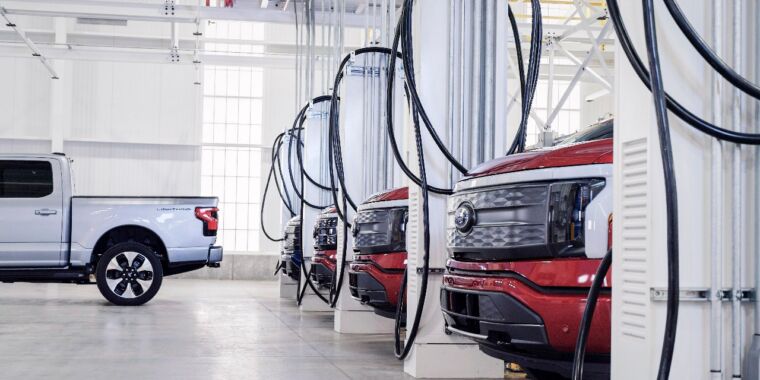For the last two years, a small “skunkworks” at the Ford Motor Company has been working on a low-cost electric vehicle platform, according to Ford CEO Jim Farley. Farley revealed the existence of this new platform during the automaker’s quarterly financial results call with investors on Tuesday evening. The company is rethinking its electrification strategy, having now faced up to the reality that the current crop of EVs are too expensive for mass-market adoption to take off.
Ford was early to market with its Mustang Mach-E crossover, itself the product of a skunkworks-style development process: an internal group called Team Edison, formed to add some excitement to what was originally going to be a more boring compliance car. The team also took the bold step of making a fully electric version of the country’s bestselling vehicle, the F-150 pickup truck.
Demand for the electric F-150 Lightning appeared strong, but a series of price hikes has resulted in really expensive trucks languishing on dealer forecourts and Ford cutting production shifts to reduce output. The Mustang Mach-E is still selling, although with barely any growth year on year.
Ford also split its EV activities into a separate division, called Model e, which exposes just how much money this is all costing—a loss of $4.7 billion. That’s quite a lot more than the $3 billion it thought Model e would lose in 2023.
Farley said the company will develop smaller and cheaper EVs, although he did not announce any specific new models by name. “All of our EV teams are ruthlessly focused on cost and efficiency in our EV products because the ultimate competition is going to be the affordable Tesla and the Chinese OEMs,” he said.
“We made a bet in silence two years ago,” Farley said of Ford’s newest skunkworks. “They’ve developed a flexible platform that will not only deploy to several types of vehicles but will be a large install base for software and services,” he told investors.
Ford may scale back some of its battery factory ambitions, too. “One of the things we’re taking advantage of in taking some timing delays is rationalizing the level and timing of our battery capacity to match demand and actually reassessing the vertical integration that we’re relying on, and betting on new chemistries and capacities,” Farley said.
In 2023, Ford announced and then canceled a $3.5 billion plant to manufacture lithium iron phosphate battery packs in Michigan. But there are also three lithium-ion factories in the works in Kentucky and Tennessee.
Ford no longer expects Model e to be profitable by 2026, but Ford CFO John Lawler said that Model e would need to stop losing money “sooner or later.”
“EVs are here to stay, customer adoption is growing, and their long-term upside is central to Ford+,” said Lawler. “The customer insights we’re getting by being an early mover in electric pickups, SUVs, and commercial vehicles are invaluable—especially as we’re developing next-generation EVs that are going to surprise customers and be profitable within a year of launch.”



To bad you can’t legally drive them on public roads without north American safety regulation certification.
Yeah, they have to survive getting rammed into by someone’s M1 Abrams Raptor.